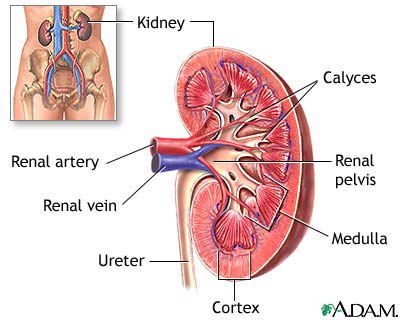Symptoms & Signs
Common symptoms of nephritic syndrome are:
* Swelling of the face, eye socket, legs, arms, hands, feet, abdomen, or other areas
* Blood in the urine (urine appears dark, tea colored, or cloudy)
* Decreased urine volume (little or no urine may be produced)
Other symptoms that may occur include:
* Blurred vision
* General aches and pains (joint pain, muscle aches)
* General ill feeling (malaise)
* Headache
* Slow, sluggish, lethargic movement
* Cough containing mucus or pink, frothy material
* Decreased alertness, drowsiness, confusion
Patients may develop symptoms of acute kidney failure or end-stage kidney disease.
Diagnosis & Tests
During an examination, your health care provider may find the following signs:

* High blood pressure
* Signs of fluid overload (when examining the abdomen)
* Enlarged liver
* Abnormal heart and lung sounds
* Enlarged neck veins from increased pressure
* General swelling
* Signs of acute kidney failure
Tests that may be done include:
* BUN
* Creatinine
* Creatinine clearance
* Urinalysis
* Urine appearance and color
* Potassium test
* Protein in the urine
A kidney biopsy will reveal inflammation of the glomeruli, which may indicate the cause.
Tests to determine the cause of acute nephritic syndrome may include:
* ANA titer (lupus)
* ANCA (antineutrophil cytoplasmic antibody for vasculitis)
* Anti-glomerular basement membrane antibody
* Blood culture
* Culture of the throat or skin
* Serum complement (C3 and C4)
Acute nephritic syndrome: Overview, Causes
Acute nephritic syndrome: Symptoms & Signs, Diagnosis & Tests
Acute nephritic syndrome : Treatment
Reviewed By : Parul Patel, MD, Private practice specializing in Nephrology and Kidney and Pancreas Transplantation, California Pacific Medical Center, San Francisco, CA. Review provided by VeriMed Healthcare Network. Also reviewed by David Zieve, MD, MHA, Medical Director, A.D.A.M., Inc.
